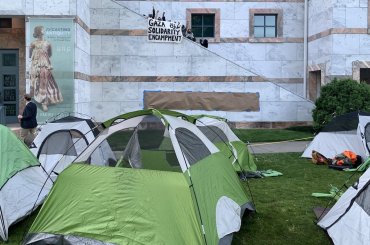As a political and human rights activist, I came to realize that the debate on a one-state solution in Israel/Palestine reveals a more profound issue of boundaries – not geographical ones, but psychological ones. This is especially true for Israeli liberal leftists, who talk about “one-state” with two contradictory voices.
When the concept of one-state is discussed by the liberal left in Israel, and worldwide, they are quick to squelch the idea of an egalitarian society, probably due to their growing fear of Arabs and Islam. Their Orientalist point of view is divisive at its core because it creates an “us vs. them” atmosphere. This division into two groups is deeply rooted in their ceaseless need to create different encampments, with opposing goals and needs. Here, “they” do not want the same things as “we” do, so “we” should separate from “them” instead of partnering together to create a heterogenous, inclusive society for all of us. Such a dualistic worldview derives from a basic disbelief in the possibility that there are common goals shared between the two peoples, Jews and Palestinians – or even a joint common ground where they can live together in one land in peace. Instead, division and separation is embraced by these liberals, although their side of the political map denotes they should be playing the part of those who believe in humankind and in the possibility of unity between two people sharing the same geographical spot on the globe.
If you follow closely, you will find that the Zionist Israelis’ debate on the idea of one-state is incongruent and hypocritical. Their inconsistent discussion points cause a volatile shift in the Israeli political atmosphere. On one hand, they often state that they would want to live in a democratic country. On the other hand, they insist that they would still want the country to remain Jewish. These cannot go hand in hand, and if they want a democracy, they cannot maintain their privileged, religious supremacy and continue their domination over the indigenous Palestinian population. Democracy cannot coexist with apartheid. This is why in Israel, the left, in its pure meaning, is practically nonexistent.
Perhaps this is due to nebulous Jewish fears of history repeating itself, or it may simply be a case of racist Zionists driven by an oppressive ideology; but, the reality is that the great majority of Israelis are unwilling to fully comprehend the actions and violations committed in their name by the Israeli regime. At the same time, they are also utterly unwilling to give up their privileges, not even for the sake of full equality, let alone democracy. Sure, they call out loudly for “peace;” sure, they cry out for “coexistence,” yet they continue to see the Palestinians as a “demographic” threat, vehemently ignoring and dismissing their native ownership over the land. Their use of words such as “coexistence” and “peace” whitewashes Israel’s rabid and erratic political reality, and are uttered only to ease their conscious as if they are truly attuned to the plight of the oppressed. Israelis gloss over their false perceptions and persistent fear, which are devoid of any feelings of solidarity or respect for basic human rights. This is no “left” in comparison to how political leftists think and operate worldwide. Israeli leftists are pseudo leftists.
The Israeli left is downright delusional. To them, unity, inclusiveness, and coexistence are only valid if Palestinians abide by the Jewish supremacist ideology. They would speak of their heartfelt desire to live together in harmony with the Palestinians as long as the conversation that is taking place does not include a call for deep, concrete social change. But once specific words or concepts are further explored, suddenly a different side in them is brought to light and exposes their unyielding resentment towards the Palestinian plight. You can talk with them about an egalitarian country for all people, you can talk about democracy, you can even talk about injustice and the need for equal rights, but just don’t mention the Palestinian right of return. Or the Palestinian majority. Or the Palestinians, for that matter. There seems to be a rigid limit to how far they are willing to go in a discussion, and tend to put their foot down when in comes to changing their misconception regarding Palestinian rights impinging on theirs. They talk of coexistence and democracy only to calm their feelings, as if to say “We do have a moral compass. We do want to be accepting towards others’ right of existence.” But the deeper the debate becomes, a contradictory voice echoes out, exposing their deep fear and even feelings of hatred towards Palestinians. There is a good side to such an awkward debate: it exposes the true intent of these so-called “leftists” and their inability to identify with the simple humane sense of solidarity towards an oppressed group.
Discussion, debate, talk – In general, the one-state or two-states initiatives tend to come with the word “solution.” I find this terminology highly misleading. Referring to something as a solution would mean that there is a problem or a conflict, which can only happen between two equals, and which can only be resolved by creating something new – i.e. a “solution.”
This is why the idea of one-state is not a solution, but an initiative. Since the situation is not even close to being a conflict, and is actually a case of one people oppressing another, we do not need to find a “solution;” we need to stop the wrongdoing. We need to create change. We need to abolish the status quo, and we need to dismantle Zionism. It isn’t a math problem that we need to solve. Nothing here can be equal if one side is perpetrating crimes against a weaker side under the pretense of safeguarding its own existence. This perpetrating side must be stopped, not solved. In fact, it is not even a problem, it is not a quarrel, nor is it a fight. The term “solution” suggests the idea that two sides are equally responsible, but the horrendous acts of terror imposed by the Zionist regime on the Palestinians is nothing of the sort, and there are no two sides to this story. Israel is a strong country, with a powerful military force. The Palestinian collective is no match to this, and isn’t even close to being equal to Israel in any way. Instead, Palestinians in the West Bank and Gaza are disenfranchised people living under a belligerent military occupation, ruled by Israel’s apartheid regime, which is fed by Zionists’ downright racist xenophobia, expressed in Israel’s violence – in words, ideology, and action – against the indigenous people.
The realization of the one-state initiative is an important step towards human rights for all, but not the only one that must be taken. The goal here is to create one-state with equal rights for all. This is more than just a “new Israel,” as Israeli Zionist leftists would want to call this one-state. In fact the new state must have a new name. It cannot be called Israel, which is the historical name chosen by the colonialist Jews, with Palestinians having no say in the matter. If the name of this new one-state will remain Israel, it would not really reflect a true change, only a continuation of the status quo.
A key advancement in direction of a one-state initiative is for Israelis to forego divisiveness in favor of inclusiveness. Instead of this xenophobic core concept in the Zionism ideology, those claiming to be forward-thinking leftists should embrace and overcome what they fear most. No more “us vs. them,” but “all of us” as people in this one land, one state.
This would lead to the actual creation of the real, equal, democratic state, rather than the oppressive apartheid-led one that Israel is now.



we had a conversation here once about what a one state would be called. and as i recall, the consensus was jerusalem or al quds. it’s not unprecedented, think new york, ny.
thanks for the excellent article Danielle Alma Ravitzki
All round excellent essay.
“Since the situation is not even close to being a conflict, and is actually a case of one people oppressing another, we do not need to find a “solution;” we need to stop the wrongdoing.”
Nathan, take note.
Instead of wittering about “ending the conflict”, get down to the task of stopping the oppression.
Thank you, Ms. Ravitzki, for this eloquent, clear-eyed, open-hearted statement. For Jews who are emotionally invested in Israel, it is a difficult dilemma. For me, as a non-Jewish American, it’s a bit simpler, at least conceptually. I’d like to see my country end its diplomatic, financial and military support of the oppression and dispossession and start using the money to aid the victims, whether they live in a Jim Crow Israel, or a Bantustan Palestine, or a refugee camp in Jordan, or wish to move elsewhere. At a practical level, of course, neither of us has the power to implement a solution.